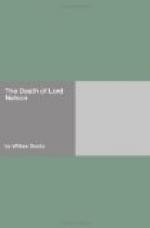An opinion has been very generally entertained, that Lord NELSON’S state of health, and supposed infirmities arising from his former wounds and hard services, precluded the probability of his long surviving the battle of Trafalgar, had he fortunately escaped the Enemy’s shot: but the Writer of this can assert that HIS LORDSHIP’S health was uniformly good, with the exception of some slight attacks of indisposition arising from accidental causes; and which never continued above two or three days, nor confined him in any degree with respect to either exercise or regimen:[29] and during the last twelve months of his life, he Complained only three times in this way. It is true, that HIS LORDSHIP, about the meridian of life, had been subject to frequent fits of the gout: which disease however, as well as his constitutional tendency to it, he totally overcame by abstaining for the space of nearly two years from animal food, and wine and all other fermented drink; confining his diet to vegetables, and commonly milk and water. And it is also a fact, that early in life, when he first went to sea, he left off the use of salt, which he then believed to be the sole cause of scurvy, and never took it afterwards with his food.
HIS LORDSHIP used a great deal of exercise, generally walking on deck six or seven hours in the day. He always rose early, for the most part shortly after day-break. He breakfasted in summer about six, and at seven in winter: and if not occupied in reading or writing dispatches, or examining into the details of the Fleet, he walked on the quarter-deck the greater part of the forenoon; going down to his cabin occasionally to commit to paper such incidents or reflections as occurred to him during that time, and as might be hereafter useful to the service of his country. He dined generally about half past two o’clock. At his table there were seldom less than eight or nine persons, consisting of the different Officers of the ship: and when the weather and the service permitted, he very often had several of the Admirals and Captains in the Fleet to dine with him; who were mostly invited by signal, the rotation of seniority being commonly observed by HIS LORDSHIP in these invitations. At dinner he was alike affable and attentive to every one: he ate very sparingly himself; the liver and wing of a fowl, and a small plate of macaroni, in general composing his meal, during which he occasionally took a glass of Champagne. He never exceeded four glasses of wine after dinner, and seldom drank three; and even these were diluted with either Bristol or common water.




